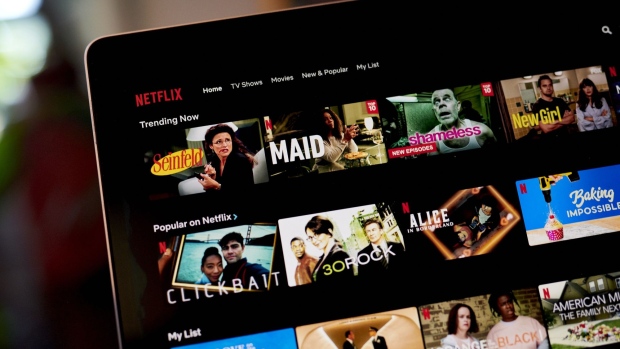Feb 3, 2023
Netflix Password Crackdown Is Underway in Chile and Frustrating Customers
, Bloomberg News

(Bloomberg) -- Cristian Castro had been a Netflix Inc. customer for years.
The 48-year-old electronics importer in Santiago, Chile, said he’s put up with efforts by the company to prevent non-subscribers from watching its movies and TV shows. Since Castro doesn’t have a fixed internet service at home and uses a wireless signal to connect, that often meant confirming he was a customer through a text message on his phone.
What happened this week was the last straw, he said. His account was disabled and Castro was told he had to use a QR code to prove he was a customer. That didn’t work on his phone. He tried to validate his account through a web browser and was told it didn’t recognize his wireless connection. He was disconnected, and he quit.
“That a person who has everything in order and still can’t access their account is abusive,” he said.
There may be a whole lot more unhappy customers like Castro as Netflix begins rolling out efforts to crack down on people who share their passwords globally in the next few weeks. It’s a big source of lost revenue for the company. Netflix estimates as many 100 million households are watching the service for free. But its efforts to keep everyone honest are frustrating a lot of users who don’t want to have to always prove they’re legit.
Online searches for “cancel Netflix” have surged in the past week, both in the US and abroad. Much of that has been fanned by stories about how the company accidentally posted rules about password sharing in Chile, Costa Rica and Peru on web pages applying to other countries.
“I think it’s worth noting that this will not be a universally popular move,” Netflix Co-Chief Executive Officer Greg Peters said on a conference call with investors last month. “There will be current members that are unhappy with this move. We’ll see a bit of a cancel reaction to that.”
Much as it has in the past with price increases, Peters said he believes the company will be able to retain or win back customers with its programming lineup. “Our job is to continue to grow value, right? To have more amazing titles that people cannot wait to see.”
In several Latin American countries, where Netflix began testing the password crackdown last year, the company has been offering customers the option of paying an extra $3 or so a month to authorize another user outside their home.
How Netflix knows who is who is complicated, however. On its website it warns residents of Chile and other countries that they could be disconnected if they don’t watch once at least every 31 days or if they’re away from their home for an extended time. Customers who are traveling can request a temporary access code that lasts seven days. The company says it monitors IP addresses, device identifications and account activity to determine whether a customer is signed on from their primary residence.
Meanwhile, the number of customer complaints about Netflix in Chile posted on Reclamos.cl, a website where people air their frustrations with local corporations, rose to 139 in 2022 from 41 the year before. The average number of complaints between 2012 and 2021 was 53. Reclamos.cl also adds that Netflix only resolves 26% of complaints.
On Twitter customers began venting with the hashtag #ChaoNetflix (goodbye Netflix) with users arguing the platform is not worth the stress of having to corroborate their account every time they sign in from a different location. The company has also become the frequent target of critical memes on Instagram.
Josefa Wilkins, a 32-year-old Netflix customer in Chile, said the company’s crackdown flies in the face of the pandemic-era trends of people working remotely.
“I shift between working in the city and from the coast all the time, does Netflix expect me to pay for different accounts depending on my location?,” she said in an interview with Bloomberg. “I am certainly not doing that.”
Castro, the electronics importer, said he’s content with his decision to ditch Netflix because he still has Amazon Prime and HBO. “I’m sticking to those,” he said.
©2023 Bloomberg L.P.